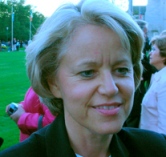When Erica Slikkers and Kristin Denslow sit in their university classroom today, they sit next to students representing a rich tapestry of races and countries. Slikkers and Denslow attend a school that is regarded as one of the top educational institutions in the United States recognized for its diversity and international makeup of the student body. They are at Andrews University, a private school operated by the Seventh-day Adventist Church in Berrien Springs, Michigan, and one of the denomination's premier educational institutions.
The diversity of Andrews University is clearly seen in the fact that since its establishment in 1874, the school has steadily increased its international scope. Today, a visitor to Andrews is able to mingle with people from some 90 countries.

According to Rebecca May, university relations director, the school's commitment to academic excellence is recognized with the university's continued ranking by U.S. News & World Report's America's Best Colleges edition as one of only 162 state-sponsored and 86 private institutions of higher education in the United States to receive the publication's "National University" ranking.
"Andrews is the only Seventh - day Adventist University to hold this distinction," May said. According to the August 29, 2005 issue of U.S. News & World Report, a National University "offers a wide range of undergraduate majors as well as master's and doctoral degrees; many strongly emphasize research." Currently, Andrews offers approximately 180 undergraduate, master's and doctoral programs.
In a recent report on the state of national universities, Andrews also ranked at number six for percentage of international students on campus, with 12 percent of the student population coming to Andrews from all over the world. The university was also ranked as the 16th most diverse campus of any national university, public or private.
Commenting on the ranking Andrews has within the national educational mosaic, May said "many national universities, public or private, work diligently to recruit students from diverse ethnic backgrounds, and increase the percentage of international students to their campus."
"It's been a way of life for Andrews University, and the world church, for so many years that we almost take it for granted," May added.
The university administration and faculty are currently involved in discussing ways to recreate Andrews as a "new university for the new century."
Among the issues under evaluation is "how to turn our diverse population into an educational asset for the new century," Niels-Erik Andreasen, president of the university, told Adventist News Network. Commenting on the implications for educational development, he listed such areas as "mind expansion and understanding, as well as experience for living."
According to Andreasen, "Andrews is distinctly situated to draw on our legacy, our leadership, and our substantial resources in developing future leaders during this challenging time of earth's history. And we will strengthen our efforts to inspire our students, graduate and undergraduate, to seize the opportunities to fully participate in the culturally, socially, spiritually and intellectually rich campus community."
Andreasen believes that this will prepare students, in ways not available anywhere else, "to provide leadership in both the public sector and private sector, where the struggles to adjust to changing world demographics and globalization are most acute."
May echoed these comments: "As we read the news every day, we realize that living in this multicultural environment provides experience for our students that goes beyond the classroom."
Current enrolment for this academic year increased by 70 students for a student body of 3,087. May said that "as evidenced by this year's increased enrolment; more and more students are finding Andrews University the right place to 'Seek knowledge. Affirm faith. Change the world,'" as stated in the school's mission statement.
Besides the Berrien Springs campus, Andrews University has affiliates and extension programs in different parts of the world, serving the needs of a growing and changing denomination, and providing education to another 1,700 students elsewhere. "This positions us as educational servants to the world church," Andreasen added.
However, there remains a need for educated leaders to support the church's expansion, he admitted. This is "to bring Adventist influence to various fields in the public sector, and to provide faith-based education for the world Adventist family. Andrews University stands on the cusp of a new era in Adventist education and is uniquely prepared to serve the global needs of our worldwide church," he concluded. [Editor: Ray Dabrowski for ANN/APD]
